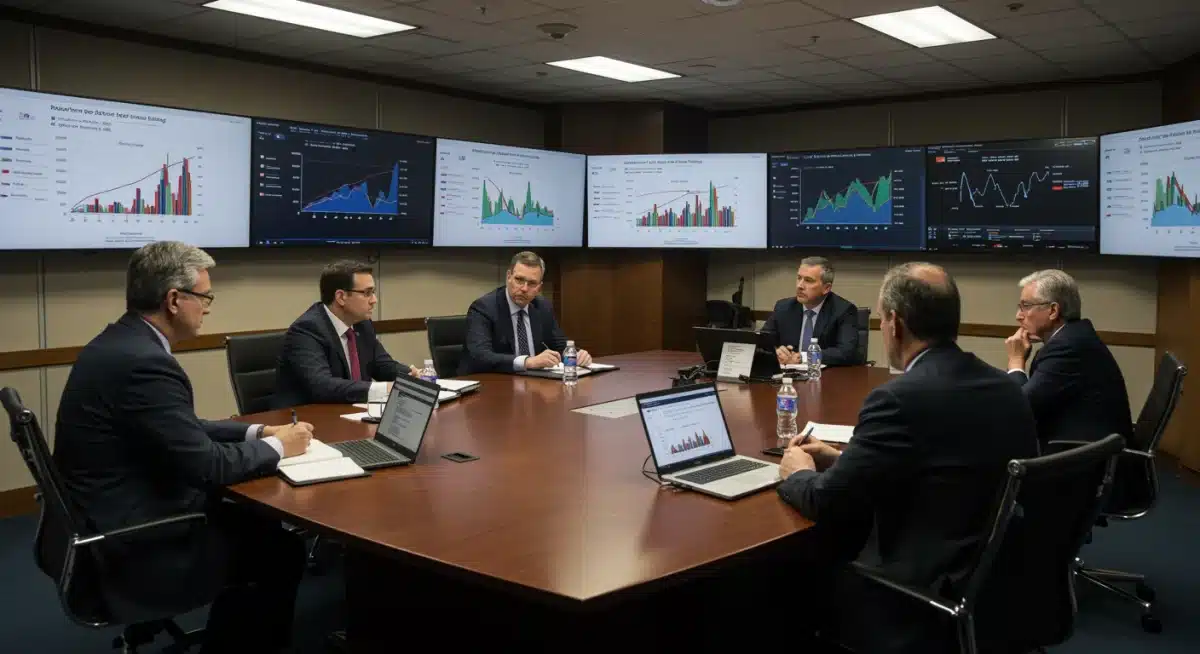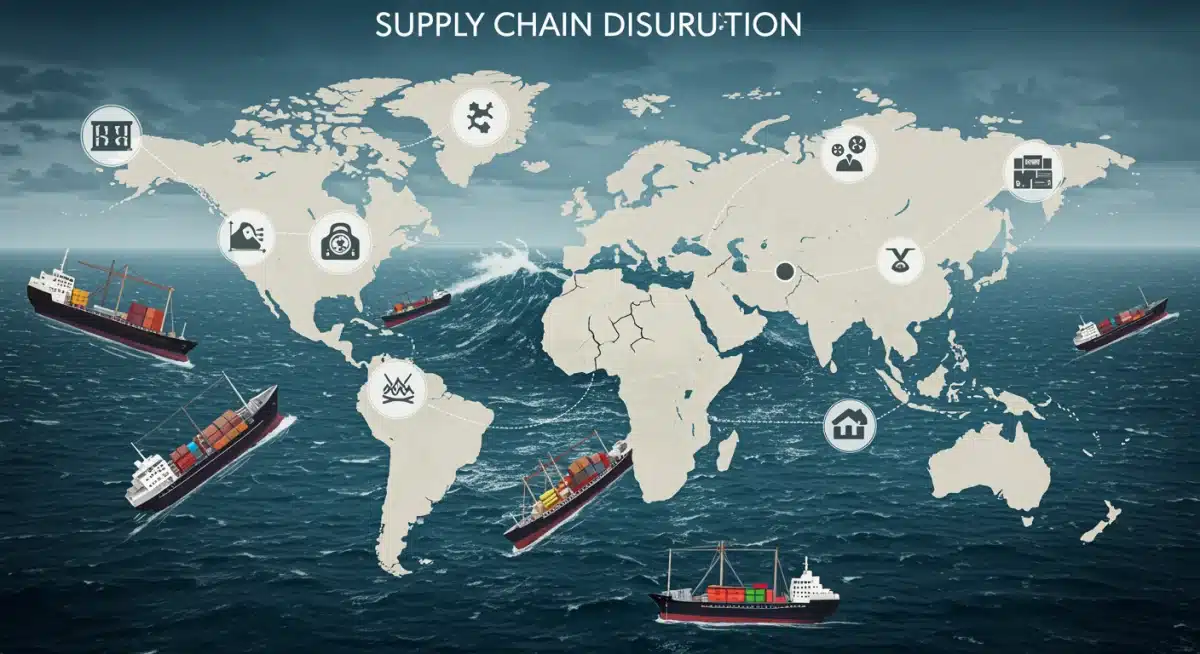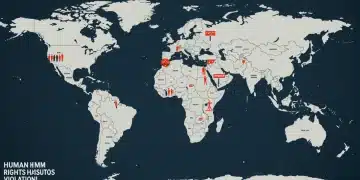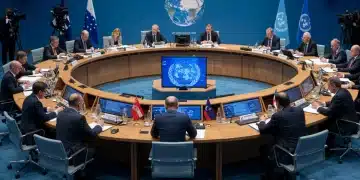Economic Sanctions 2025: 7 New Measures & US Financial Impact

Economic Sanctions 2025: A Deep Dive into 7 New Measures and Their Global Repercussions for US Interests (FINANCIAL IMPACT, RECENT UPDATES) are shaping today’s agenda with new details emerging from officials and industry sources. This update prioritizes what changed, why it matters, and what to watch next, in a clear news format.
As 2025 approaches, the landscape of international relations is being significantly reshaped by the impending introduction of new economic measures. The focus on Economic Sanctions 2025: A Deep Dive into 7 New Measures and Their Global Repercussions for US Interests (FINANCIAL IMPACT, RECENT UPDATES) is critical for understanding the evolving global financial and political dynamics. These anticipated sanctions are poised to exert substantial pressure on targeted entities and nations, while simultaneously creating ripple effects that will be felt across the entire international system, particularly impacting US economic and strategic interests.
Understanding the New Sanctions Landscape for 2025
The year 2025 is expected to usher in a series of sophisticated economic sanctions, moving beyond traditional asset freezes and travel bans to encompass more intricate financial and technological restrictions. These measures are designed to be more targeted and potent, aiming to achieve specific foreign policy objectives without resorting to military intervention. The shift reflects a growing trend towards economic statecraft as a primary tool in international diplomacy and conflict resolution.
The new sanctions framework is a direct response to escalating geopolitical tensions, persistent human rights abuses, and the proliferation of weapons of mass destruction. US policymakers are refining these tools to address emerging threats and to maintain strategic advantage in a rapidly changing world. The detailed architecture of these sanctions indicates a concerted effort to minimize unintended consequences on allied economies, while maximizing pressure on adversaries.
Key Drivers Behind the 2025 Sanctions
- Geopolitical Realignment: Shifting alliances and rivalries necessitate new approaches to influence state behavior.
- Technological Advancements: The rise of digital currencies and cyber warfare requires innovative sanction mechanisms.
- Human Rights Concerns: Continued global pressure to address systemic human rights violations remains a core driver.
- Non-Proliferation Efforts: Preventing the spread of dangerous technologies and weapons is a paramount national security interest.
These drivers collectively inform the strategic design of the Economic Sanctions 2025, ensuring they are both relevant and impactful in the current global climate. The precision of these measures is intended to provide surgical strikes rather than broad economic disruptions, though the latter remains a risk.
The Seven Core Measures: A Detailed Overview
The impending sanctions for 2025 are characterized by seven distinct measures, each designed to address specific vulnerabilities and leverage points. These measures represent a significant evolution in sanction policy, aiming for greater efficacy and adaptability. Understanding each measure is crucial for anticipating their global repercussions and financial impact.
These new measures build upon existing frameworks but introduce novel mechanisms that target emerging economic sectors and financial instruments. They are the culmination of extensive intelligence gathering, economic modeling, and policy debates within various US government agencies. The goal is to create a multi-layered approach that is difficult for sanctioned entities to circumvent.
Measure 1: Advanced Technology Export Controls
This measure targets the export of critical and emerging technologies, including AI, quantum computing, and advanced semiconductors. The aim is to hobble the technological development of adversarial nations, particularly those with military applications. The financial impact on US tech companies involved in international trade could be substantial, requiring careful navigation of new compliance regulations.
Measure 2: Expanded Financial Sector Restrictions
Beyond traditional banking restrictions, this measure will focus on secondary sanctions against foreign financial institutions that facilitate transactions for sanctioned entities. It also includes restrictions on access to specific international payment systems, increasing the cost and complexity of illicit financial flows. This could create significant compliance burdens for global banks, including those with US operations.
Measure 3: Targeted Energy Sector Divestment
This sanction aims to restrict investment in and procurement from the energy sectors of targeted countries. It could involve prohibitions on US companies and individuals from engaging in joint ventures, providing financing, or purchasing energy products from specific state-owned enterprises. The measure seeks to reduce revenue streams for adversarial regimes, potentially impacting global energy markets and prices.
Measure 4: Cyber-Related Sanctions Enhancements
Building on existing authorities, these enhancements will allow for quicker and more comprehensive sanctions against individuals and entities involved in malicious cyber activities targeting US critical infrastructure or democratic processes. This measure aims to deter state-sponsored hacking and cyber espionage, with potential repercussions for technology providers and cybersecurity firms globally.
Measure 5: Digital Currency and Blockchain Scrutiny
Recognizing the growing role of cryptocurrencies in evading traditional financial controls, this measure introduces new regulations and sanctions targeting the use of digital assets for illicit purposes. It includes increased transparency requirements for blockchain transactions and potential asset freezes of cryptocurrency holdings. This will have a significant impact on the nascent digital finance sector and require new compliance strategies.
Measure 6: Supply Chain Due Diligence Mandates
This measure imposes stricter due diligence requirements on US companies regarding their supply chains, particularly concerning forced labor and human rights abuses in specific regions. Companies will face penalties for non-compliance, pushing them to re-evaluate and reconfigure global sourcing strategies. This could lead to higher operational costs and shifts in manufacturing locations.
Measure 7: Sanctions on Intellectual Property Theft
A novel measure, this targets entities and individuals involved in the systematic theft of US intellectual property. It includes asset freezes and travel bans, as well as restrictions on their ability to conduct business with US companies. This aims to protect American innovation and competitiveness, with potential implications for international research collaborations and technology transfer.
These seven measures collectively underscore a robust and adaptive approach to foreign policy. Each measure is designed to be a potent instrument, and their combined effect is anticipated to create significant strategic challenges for sanctioned entities, while also demanding careful navigation from US businesses and allies to mitigate adverse effects.

Global Repercussions and US Interests
The introduction of Economic Sanctions 2025 will undoubtedly trigger a cascade of global repercussions, affecting not only the targeted nations but also the broader international community. For US interests, these repercussions are a double-edged sword: designed to protect national security and economic prosperity, but also carrying the risk of unintended blowback.
The interconnectedness of the global economy means that sanctions rarely operate in isolation. Supply chains, financial markets, and diplomatic relations are all susceptible to disruption. US policymakers are acutely aware of these dynamics and have attempted to craft measures that are both effective and strategically sound, though perfect isolation of impact is impossible.
Impact on International Trade Dynamics
The new sanctions, particularly those concerning advanced technology exports and energy sector divestment, will inevitably alter international trade flows. Countries reliant on sanctioned nations for raw materials or finished goods will seek alternative sources, potentially leading to new trade partnerships and reconfigurations of global supply chains. US companies involved in these sectors will need to adapt quickly to new market realities and compliance requirements.
For example, restrictions on advanced technology could accelerate efforts by sanctioned nations to develop indigenous capabilities, potentially fostering technological decoupling in the long run. This could create bifurcated markets, presenting both challenges and opportunities for US innovators.
Financial Market Volatility and Stability
Expanded financial sector restrictions and digital currency scrutiny are likely to introduce periods of volatility in global financial markets. Banks and financial institutions worldwide will need to enhance their compliance frameworks, leading to increased operational costs. The US dollar’s role as the world’s primary reserve currency could also face scrutiny if sanctions are perceived as overly aggressive or unilateral by a broad coalition of nations.
Conversely, the robust enforcement of these sanctions could bolster confidence in the integrity of the US financial system, attracting further investment and strengthening its global standing. The balance between deterrence and stability will be a key challenge for financial regulators.

Financial Impact on US Businesses and Economy
The financial impact of Economic Sanctions 2025 on US interests is multifaceted, presenting both potential costs and strategic advantages. While the primary goal is to exert pressure on adversaries, US businesses and the broader economy will not be immune to the ripple effects. Understanding these impacts is crucial for proactive planning and mitigation.
US companies operating internationally, especially those in technology, finance, and energy, will face heightened compliance costs and potential market access restrictions. The government aims to support these businesses through guidance and, where possible, exemptions, but the onus will largely be on corporations to navigate the complex new regulatory environment.
Compliance Costs and Market Access
US companies will incur significant costs in updating their compliance programs, conducting enhanced due diligence, and training personnel to adhere to the new sanction regimes. Companies with extensive international operations or complex supply chains will be particularly affected. Moreover, certain markets may become entirely inaccessible, forcing businesses to seek new opportunities or withdraw from lucrative regions.
The advanced technology export controls, for instance, could limit the revenue streams for some US tech giants, while the supply chain mandates might necessitate costly reconfigurations of production networks. The long-term benefits, however, are expected to outweigh these short-term costs by safeguarding intellectual property and national security.
Investment Flows and Capital Markets
The sanctions on intellectual property theft and digital currency scrutiny are intended to protect US innovation and financial integrity, potentially making the US a more attractive destination for foreign direct investment. However, increased global uncertainty stemming from the sanctions could also lead to a temporary slowdown in cross-border capital flows as investors adopt a wait-and-see approach.
The stability and transparency of US capital markets, reinforced by these measures, are likely to remain a draw for global investors seeking safe havens. The challenge lies in communicating the strategic rationale effectively to prevent misinterpretations that could deter investment.
Recent Updates and Policy Debates
As 2025 draws nearer, discussions surrounding the implementation and potential adjustments to the Economic Sanctions 2025 are accelerating within Washington and among international partners. Recent updates reveal a dynamic policy environment, with continuous evaluation and refinement of the proposed measures based on evolving geopolitical realities and economic analyses.
Policy debates are currently centered on the scope of certain measures, the potential for humanitarian exemptions, and the mechanisms for international cooperation. The administration is keen to build a broad coalition of support for these sanctions to maximize their effectiveness and legitimacy on the global stage.
Congressional Oversight and Executive Orders
Congress continues to play a vital oversight role, with various committees holding hearings to scrutinize the proposed sanctions and their potential impact. Executive orders are expected to formalize many of these measures, granting the Treasury Department and other agencies the authority to implement and enforce them. The legislative process ensures a degree of checks and balances, although the executive branch typically holds significant sway in foreign policy matters.
Recent reports indicate bipartisan support for strengthening US sanction capabilities, signaling a unified front on national security issues. This consensus is crucial for the long-term viability and credibility of the new measures.
International Consultations and Alliances
The US government is actively engaging with key allies in Europe, Asia, and other regions to coordinate efforts and ensure a unified approach to the new sanctions. These consultations are vital for mitigating retaliatory actions from sanctioned states and for sharing the burden of enforcement. Building robust international partnerships is a cornerstone of effective sanction policy.
However, achieving complete alignment among allies can be challenging due to differing national economic interests and foreign policy priorities. The success of Economic Sanctions 2025 will largely depend on the degree of multilateral cooperation achieved.
Navigating the Compliance Complexities of 2025
For businesses, financial institutions, and individuals operating in the global arena, understanding and navigating the compliance complexities introduced by Economic Sanctions 2025 will be paramount. The intricate nature of the seven new measures demands a proactive and sophisticated approach to regulatory adherence to avoid severe penalties and reputational damage.
Compliance is no longer merely a legal obligation; it is a strategic imperative. Companies that fail to adapt their internal controls and risk management frameworks to the new sanction environment face significant operational and financial risks. This section outlines key strategies for effective compliance.
Developing Robust Internal Control Systems
Companies must invest in upgrading their internal control systems to detect and prevent sanction violations. This includes implementing advanced screening software for transactions and counterparties, conducting thorough due diligence on all business partners, and maintaining comprehensive records. The focus on digital currency scrutiny, for example, will require new technological solutions to monitor blockchain activities.
Regular audits and independent reviews of compliance programs are also essential to ensure their effectiveness and to identify any potential weaknesses. A proactive stance on compliance can turn a regulatory burden into a competitive advantage, demonstrating a commitment to ethical and legal business practices.
Training and Awareness Programs
- Employee Education: Regular training for all relevant staff, from executives to front-line employees, on the specifics of the new sanctions.
- Risk Spotting: Equipping employees with the knowledge to identify red flags and suspicious activities related to sanction evasion.
- Reporting Mechanisms: Establishing clear and confidential channels for employees to report potential violations.
A well-informed workforce is the first line of defense against sanction breaches. Companies should prioritize continuous education to keep pace with the evolving regulatory landscape and the increasingly sophisticated methods used by sanctioned entities to evade controls. The human element in compliance remains as critical as technological solutions.
Future Outlook and Strategic Adaptations
The long-term outlook for Economic Sanctions 2025 suggests a continued reliance on economic tools as a staple of US foreign policy. The strategic adaptations required from nations, businesses, and international organizations will shape the global economic and political order for years to come. The emphasis will remain on flexibility and the ability to respond to new challenges.
Nations under sanction will likely explore countermeasures, including strengthening regional economic blocs, developing alternative financial systems, and increasing self-reliance in critical sectors. This could lead to a more fragmented global economy, with distinct spheres of influence and trade networks.
Evolving Geopolitical Strategies
The US will continue to refine its sanction strategies, adapting them to new technological advancements and geopolitical shifts. This could involve more dynamic and automated sanction mechanisms, leveraging AI and data analytics to identify and target illicit activities more efficiently. The goal is to maintain a technological edge in economic statecraft.
Allies will also need to align their foreign policy objectives with the US to ensure the collective efficacy of sanctions. This collaborative approach will be crucial in presenting a united front against actions that threaten international stability and norms.
Resilience and Diversification for Businesses
Businesses will increasingly prioritize resilience and diversification in their global operations. This includes de-risking supply chains from overly reliant regions, exploring new markets, and investing in localized production capabilities. The lessons learned from the Economic Sanctions 2025 will drive long-term strategic decisions aimed at minimizing vulnerability to geopolitical shocks.
Companies that proactively adapt to these changes, embracing new compliance standards and exploring innovative business models, will be better positioned to thrive in the complex global environment shaped by these economic measures. The ability to anticipate and respond to regulatory shifts will be a key differentiator.
Key Measure |
Primary Impact on US Interests > |
|---|---|
Advanced Tech Controls |
Protects innovation, but may impact tech sector exports. |
Financial Sector Restrictions |
Enhances financial security, increases compliance costs for banks. |
Digital Currency Scrutiny |
Combats illicit finance, impacts US digital asset industry. |
Supply Chain Mandates |
Ensures ethical sourcing, may lead to higher business costs. |
Frequently Asked Questions About Economic Sanctions 2025
The main objectives are to deter hostile state behavior, address human rights abuses, prevent weapons proliferation, and protect US national security and economic interests through targeted financial and technological restrictions.
US businesses will face increased compliance costs, stricter due diligence requirements, and potential market access restrictions in certain regions. They may need to re-evaluate supply chains and investment strategies to adapt.
Yes, key sectors include advanced technology, finance, energy, and any industries with complex global supply chains. Digital asset companies will also see significant new regulations and scrutiny.
The US is actively engaging with allies through diplomatic channels to build consensus and coordinate enforcement efforts. Multilateral support is crucial for the effectiveness and legitimacy of the new sanction regimes.
Individuals should stay informed through official government advisories, financial news outlets, and legal counsel if their business or investments involve international transactions or sanctioned regions. Compliance is essential to avoid penalties.
What this means
The impending Economic Sanctions 2025 signify a strategic pivot in US foreign policy, emphasizing economic tools to achieve geopolitical objectives. For US interests, this means a more secure national landscape, but also a complex operating environment for businesses. The global repercussions will necessitate continuous monitoring and agile adaptations from all stakeholders. Staying informed on these developments is not just about compliance; it’s about understanding the evolving architecture of international power and economic influence.





